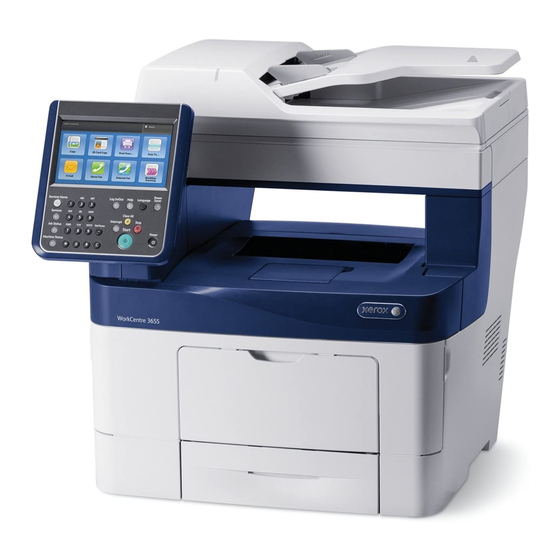- ページ 15
プリンターアクセサリー Xerox WorkCentre 6655のPDF 安全な設置と操作をオンラインで閲覧またはダウンロードできます。Xerox WorkCentre 6655 19 ページ。 Color multifunction printer
Xerox WorkCentre 6655 にも: 操作マニュアル (15 ページ), インストレーション・マニュアル (2 ページ), インストレーション・マニュアル (7 ページ), ソフトウェア・インストール・マニュアル (4 ページ), カートリッジ交換方法 (2 ページ), マニュアル (3 ページ), クイック・スタート・マニュアル (14 ページ)

c. Customers should sign up for the RSS
(Security@Xerox) at www.xerox.com/security that permits customers to view the latest Xerox Product Security
Information and receive timely reporting of security information about Xerox products, including the latest
security patches.
d. Customers who encounter or suspect software problems should immediately contact the Xerox Customer
Support Center to report the suspected problem and initiate the SPAR (Software Problem Action Request)
process for addressing problems found by Xerox customers.
e. Depending upon the configuration of the device, two IPv4 addresses, a primary IPv4 address and a secondary
IPv4 address, may be utilized. Select whether the primary IPv4 address will be obtained statically or dynamically
via DHCP from the IP (Internet Protocol) page on the Web UI
APIPA when the System Administrator enables the 'Self Assigned Address' option from the IP (Internet
Protocol) page on the Web UI. If the 'Self Assigned Address' option is enabled (which is the default case), this
secondary IPv4 address will not be visible to the SA
(Internet Protocol) page should be disabled unless either APIPA is used or Apple Rendezvous/Bonjour
support is required.
f.
If IPv6 is disabled and then a software upgrade is performed by a Xerox Service Technician using an AltBoot,
IPv6 will be disabled even though both the Control Panel and Web UI show that IPv6 is enabled. IPv6 can be
enabled again via the Web UI by first disabling and then re-enabling it.
g. Software Verification Test: Initiate the software verification test feature by following the instructions for
"Verifying the Software" in Section 4 of the SAG.
V. The following windows are available to any authenticated and authorized user from the Local User Interface. These
windows provide standard machine services or job management capability:
Embedded Fax Batch Send Confirmation – Allows a user to either send an Embedded Fax job to a remote
destination immediately or include the job as part of a "batch" of Embedded Fax jobs sent to the same destination.
Is accessible by selecting the following screens/buttons in order: [Services Home] hard button [Fax] feature
button [Start] hard button when a user is submitting an Embedded Fax Send job to the same destination as a
previously submitted "delayed send "Embedded Fax job.
Pausing an active job being processed by the device – Allows the user to pause an active copy, print, workflow
scanning, scan to email, Internet Fax or Embedded Fax job while it is being processed. Is accessible by selecting
the [Stop] machine hard button while a job is being processed by the device. Depending on the type of jobs being
processed by the device when the [Stop] button is selected, one of the following Pause windows will be displayed
as appropriate to allow the user to determine whether to delete or continue processing of the job: Scanning Pause
window, Printing Pause window, Copy Only (Scanning and Printing) Pause window, Scanning/Printing
(Simultaneous Jobs) Pause window, Scanning Build Job Segment (No Printing) Pause window, Printing
Build Job Segment (No Scanning) Pause window or Scanning Build Job Segment/Printing Another Job
Pause window.
Overwrite Security Failure – Automatically provides an error message to the user is case an Immediate Image
Overwrite of a copy, print, workflow scanning, scan to email, LAN Fax or Embedded Fax job fails. The error message
informs the user to notify the System Administrator that an On Demand Overwrite should be run and persists on
the Control Panel screen until either a manual or a scheduled On Demand Overwrite is initiated.
VI. The Web UI provides a set of on-line help pages that provide guidance on most of the Web UI pages. These on-line
help pages can be accessed from the Web UI by selecting the [Help] button on the upper right hand corner of every
Web UI page; the on-line help page corresponding to the Web UI page being viewed will be displayed. There is also a
'TOC' contents list of all Web UI help pages to the left of each help page; scrolling through the content list and selecting
the desired page will also cause the applicable on-line help page to be displayed.
The following pages are available from the Web UI with System Administrator login and authentication but are not
documented in the SAG, User's Guides or the on-line help:
Really Simple Syndication – A lightweight XML format for distributing news headlines and other content on the Web. Details for signing up for
9
this RSS Service are provided in the Security@Xerox RSS Subscription Service guide posted on the Security@Xerox site at
http://www.xerox.com/go/xrx/template/009.jsp?view=Feature&ed_name=RSS_Security_at_Xerox&Xcntry=USA&Xlang=en_US.
10
A SPAR is the software problem report form used internally within Xerox to document customer-reported software problems found in
products in the field.
The primary IPv4 address can also be assigned dynamically via DHCP from the Dynamic Addressing screen on the Control Panel.
11
The primary IPv4 address will always be displayed on the Configuration Report that can be printed for the device.
12
9
subscription service available via the Xerox Security Web Site
11
. The 'Self Assigned Address' option from the Web UI IP
12
14
. The second IPv4 address is assigned via
10
